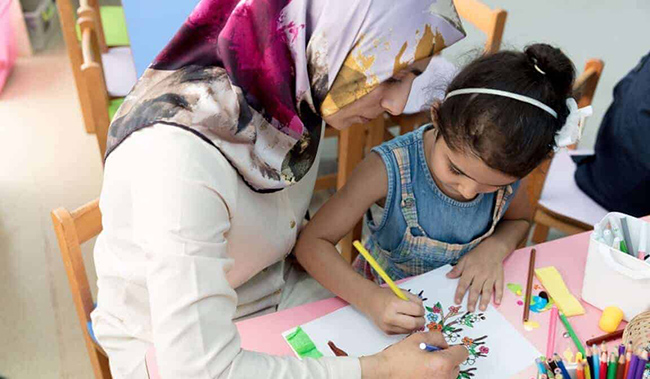Supporting parents and caregivers for Turkish children in early childhood
In Turkey, less than half of 3-to-5-year-olds attend childcare and preschool, compared to nearly 90% of children in Organisation for Economic Co-operation and Development countries.[1] AÇEV works to fill the gap in access to early childhood education by providing programs for parents and children in their own homes.
What It Does
 AÇEV was founded in 1993 to fill the gap in early education through parenting programs that promote children’s social, emotional, and cognitive development at home. They serve families in Turkey, but their approach has been replicated, with AÇEV’s assistance, in 15 low- and middle-income countries in the Middle East, Europe, and Asia.
AÇEV was founded in 1993 to fill the gap in early education through parenting programs that promote children’s social, emotional, and cognitive development at home. They serve families in Turkey, but their approach has been replicated, with AÇEV’s assistance, in 15 low- and middle-income countries in the Middle East, Europe, and Asia.
Mothers are responsible for child care in 89% of Turkish families, and 43% of women in Turkey have only a primary school degree.[2] AÇEV’s Mother-Child Education Program (MOCEP) consists of two programs. The Cognitive Education Program promotes school readiness and cognitive development by building children’s pre-literacy and numeracy skills, language development, concept formation, and problem-solving skills. The Mother Support Program helps mothers foster positive home environments that further reinforce learning. The organization also works to establish more gender-equal parenting with a Father Support Program (FSP) that empowers fathers to assume increased childcare responsibilities. In reaction to the COVID-19 pandemic, AÇEV expanded digital access to its programs for parents and its curriculum for early childhood learning through its YouTube channel, free First6Years app for caregivers, and WhatsApp text line.
How Effective It Is
AÇEV has reached more than 500,000 children, including 18,856 refugee children. Rigorous evaluations of AÇEV’s MOCEP program found that children whose mothers attended MOCEP showed stronger verbal and numerical skills in first grade and read at an earlier age than children whose mothers did not attend. They also had lower secondary school drop-out rates (2.4% vs 7.4%) and higher university attainment (44% vs 27%).[3] In addition, mothers reported increased support for child development, more democratic parenting-methods, and raised awareness of gender-equal child-rearing and domestic violence prevention.
A related cost benefit analysis found that every 1 Turkish lira spent on ACEV’s home-based MOCEP returned nearly 6 lira worth of benefits, in the form of increased productivity and earnings of those who participated. This is much higher than the 4 lira worth of benefits for every lira spent on more traditional, center-based early childhood education programs.[4] Fathers who participated in the Father Support Program were more involved in supporting their children’s development, became more aware of their childrearing responsibilities, and showed more empathy and communication.[5]
How You Can Help
Philanthropic support enables AÇEV to improve how it delivers services and materials and expand programs in Turkey and internationally. A monthly donation of $3 can support the participation of a single mother or father in its programs. $1,000 contributes to setting up a preschool classroom for 15 students and their families each year. $10,000 can contribute to 300 children’s access to an accelerated summer preschool education. Learn more at https://www.acev.org/bagis-yap/.
More Ways to Help — In the U.S., there are several nonprofits that help families ensure a strong start for their children. Child First delivers therapy in the home for families with children under 6 years of age. Nurse-Family Partnership pairs registered nurses with vulnerable women who are pregnant with their first child; the nurse continues supporting the family through the child’s second birthday. Abriendo Puertas/Opening Doors, equips low-income Latino parents in Chicago with knowledge and tools to prepare their children for kindergarten. Around the world, Sesame Workshop, the research-based nonprofit that produces Sesame Street, provides early childhood programming in low to middle income countries on six continents.
